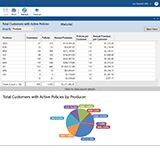Sometimes it seems like the Gecko, Flo and Mayhem are always on our television screens. The constant advertising might lead some to believe that the captive and direct-writing insurance companies these characters represent are consumers’ only choice. However, new data shows that insurance companies selling through independent agencies are thriving in the property-casualty marketplace. Direct writers and captive agency companies may dominate traditional media advertising, but they are not dominating the market. The 2013 Property-Casualty Insurance Market Report, released in early 2015 by the Independent Insurance Agents & Brokers of America, showed exceptional results for independent agency companies. Their growth in the personal lines market was as good or better than that of their competitors.
Compiled from data gathered by A.M. Best Co., the report showed that in 2013 IA companies:
– Wrote nearly 57 percent of all P-C premiums
– Wrote nearly 35 percent of all personal lines premiums
– Wrote nearly 80 percent of the $35 billion commercial lines market
– Grew their market share in 23 states and the District of Columbia
– Achieved average expense ratios for personal auto that were better than those for captive writers
– Grew in personal auto nine times faster than they did in 2011
Why are independent agency companies succeeding despite an advertising onslaught from their non-IA competitors? The independent agency model provides a number of competitive advantages:
– Their fortunes are not tied to any single insurance carrier. A captive agency sinks or swims with the performance of its one carrier. If captive carrier X raises its rates in southern Illinois to the point where its auto insurance is uncompetitive, the agency representing the carrier will see its revenue lag. An independent agency can quickly adjust to market changes. If it notices a carrier becoming more or less competitive, it can place more business with competitive carriers.
– Their fortunes are not tied to a single line of business. Some of the largest direct writers focus almost solely on the personal auto line. If the overall market for personal auto deteriorates, their results will follow suit. Independent agencies can balance their risks with other products. They can offer homeowners, watercraft, umbrellas and other personal lines. Many also offer or specialize in commercial lines and employee benefits. This makes it easier for them to survive down times in some lines. When pricing is soft in personal lines, they can make up for lost revenue by increasing revenue from employee benefits or commercial.
– They can better advocate for their clients who have claims. Captive agents are employees of their carriers. Their loyalty appropriately belongs to them. Independent agents work for themselves and have special loyalty to their clients. They always have potential leverage with their carriers. That is, they can always move business away from carriers who they perceive handle claims unfairly.
Captive agents do have their advantages. They are a good training ground for individuals who are new to the industry and have a lot to learn. They provide turnkey solutions for those clients who do not need customized insurance programs. Clients who use their cars only for commuting and pleasure, and renters with no special property, may not need unique insurance protection. The captive and direct writers’ products may be fine for them.
Captive agents certainly have plenty of advertising and marketing support – advertisements for their carriers are all over the media. Lastly, because the carriers own the captive agencies, the agencies have built-in perpetuation. When an agent leaves, the carrier can simply replace him with another employee. Independent agencies, like all small businesses, must do extensive planning for perpetuation. This can take up a significant amount of planning time. It is a constant concern of agency owners as they near retirement.
The results for 2013 show that, despite fierce competition, independent agency companies are not going away any time soon. The regional carriers, in particular, are performing exceptionally well. The competition among distribution channels will continue to give insurance buyers a wealth of choices for years to come. That is good news for them and good news for the US economy as a whole.
Looking to start an Agency? Get detailed information by reading our Guide to Starting an Insurance Agency
















